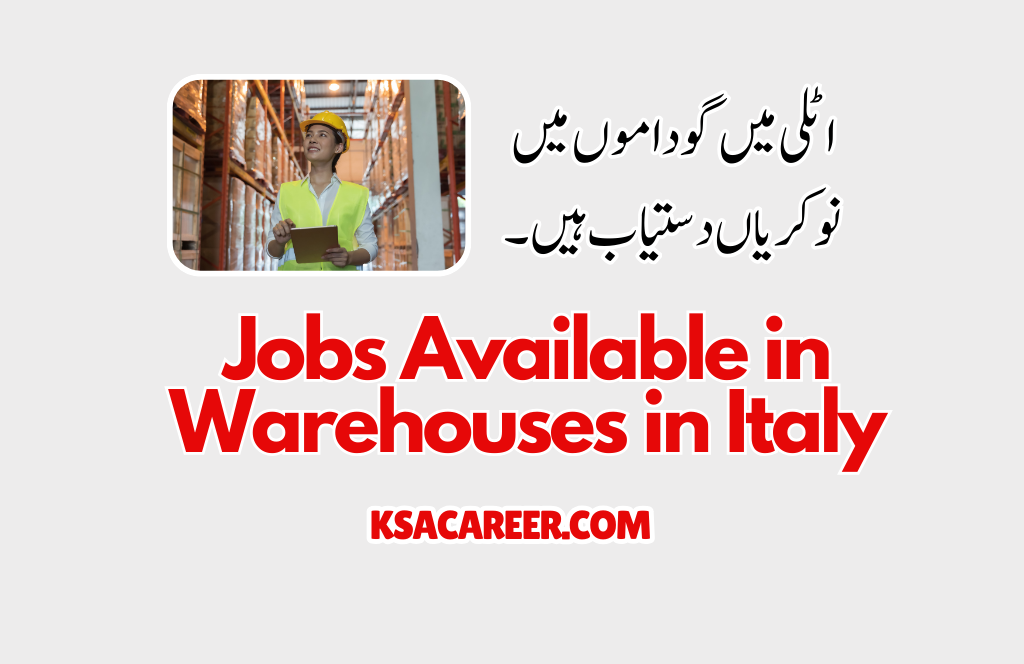Jobs Available in Warehouses in Italy
Warehouses in Italy offer a wide variety of job opportunities that are available to individuals from different backgrounds, experiences, and skill levels. The warehouse industry in Italy plays a crucial role in the supply chain and logistics sectors, and it continues to grow in demand as e-commerce and global trade increase. This article provides a detailed look at the types of jobs available in warehouses, the salary expectations, and other important factors that potential employees should know.
| Job Title | Average Monthly Salary (EUR) | Apply Now |
|---|---|---|
| Warehouse Worker (Magazziniere) | €1,500 – €1,800 | Apply Now |
| Forklift Operator (Carrellista) | €1,700 – €2,000 | Apply Now |
| Warehouse Supervisor | €2,000 – €2,500 | Apply Now |
| Inventory Clerk | €1,800 – €2,200 | Apply Now |
| Logistics Coordinator | €2,200 – €2,800 | Apply Now |
| Warehouse Manager | €3,000 – €4,000 | Apply Now |
| Packing and Shipping Specialist | €1,500 – €1,900 | Apply Now |
1. Types of Jobs in Warehouses in Italy
There are several positions available in warehouses, ranging from entry-level roles to managerial positions. Some of the most common job titles include:
1. Warehouse Operative/Worker
A warehouse operative, also known as a warehouse worker or laborer, is typically responsible for the day-to-day tasks of a warehouse. These tasks include loading and unloading goods, picking and packing items, organizing inventory, and ensuring that products are stored correctly.
Skills Required: Physical stamina, attention to detail, ability to operate warehouse equipment (such as forklifts), and teamwork.
2. Forklift Operator
Forklift operators are responsible for moving heavy goods and materials around the warehouse. They use forklifts to load/unload items from trucks, organize stock in storage areas, and ensure that all items are properly secured for transportation.
Skills Required: Certification in operating forklifts, knowledge of safety procedures, and the ability to work in a fast-paced environment.
3. Warehouse Supervisor/Team Leader
Warehouse supervisors oversee the day-to-day operations of the warehouse, ensuring that workers meet targets, maintain safety standards, and perform their tasks efficiently. They may also be responsible for inventory management and implementing processes to improve workflow.
Skills Required: Strong leadership and communication skills, experience in warehouse operations, ability to manage teams, and problem-solving skills.
4. Inventory Clerk
Inventory clerks manage stock levels, monitor stock movement, and update inventory records. They ensure that the warehouse has enough stock to meet demand and report any discrepancies in inventory.
Skills Required: Strong organizational skills, attention to detail, knowledge of warehouse management systems (WMS), and ability to handle stock-taking.
5. Shipping and Receiving Clerk
These clerks are responsible for receiving goods into the warehouse and ensuring that shipments are processed correctly. They also prepare and organize outgoing shipments, checking for damages and making sure that all necessary paperwork is in order.
Skills Required: Organizational skills, attention to detail, and knowledge of shipping protocols.
6 Warehouse Manager
The warehouse manager is responsible for overseeing the entire warehouse operation. This includes managing teams of workers, ensuring the smooth flow of goods, maintaining safety standards, and liaising with other departments to ensure timely deliveries.
Skills Required: Strong leadership and organizational skills, extensive knowledge of warehouse operations, budgeting, and compliance with safety regulations.
Warehouse managers in larger operations or with more complex logistics networks tend to earn higher salaries.
2. Factors Affecting Salary and Job Opportunities
Several factors can affect both the salary and the availability of warehouse jobs in Italy:
1. Location
Salaries in warehouse jobs can vary based on the region of Italy. Major cities like Milan, Rome, and Turin often offer higher salaries due to the higher cost of living, as well as the concentration of industries that require large-scale warehouse operations. However, rural areas or smaller towns may offer lower wages but may compensate with lower living costs.
2. Experience and Skill Level
Entry-level workers in warehouses can expect lower wages compared to those with experience. Warehouse jobs typically offer opportunities for career advancement, and those who gain additional skills—such as operating heavy machinery, inventory management, or supervisory experience—can earn higher wages.
3. Shift Work and Overtime
Many warehouse jobs in Italy involve shift work, including night shifts and weekends. Workers who take on these shifts are often entitled to additional pay, which can significantly increase their overall salary. Overtime pay may also be available during busy periods.
4. Industry
The type of industry also affects salary levels. Warehouses dealing with specialized products, such as pharmaceuticals, electronics, or luxury goods, may offer higher wages compared to those in basic consumer goods or food products. Similarly, warehouses associated with international logistics or e-commerce giants like Amazon tend to offer competitive salaries and benefits.
3. Benefits and Job Security in Warehouse Jobs
In addition to salaries, warehouse employees in Italy may enjoy various benefits, including:
- Health Insurance: Most warehouse positions offer basic healthcare coverage, either through national healthcare or employer-sponsored plans.
- Paid Vacation: Employees are entitled to paid vacation days, typically around 20-30 days annually.
- Job Security: Warehouse jobs can offer a decent level of job security, especially in larger companies with established operations. The growth of e-commerce has also increased the demand for workers in the logistics sector.
- Bonuses: Some warehouses offer performance-based bonuses or profit-sharing opportunities, especially for higher-level positions.
4. Education and Training
One of the key advantages of working in a warehouse in Italy is that education and age are generally not significant barriers to entry. Most entry-level roles require a basic level of education (e.g., high school diploma) and the ability to perform manual labor. However, certain roles may require specific certifications, such as for forklift operation or managing logistics software.
Warehouse jobs also provide opportunities for on-the-job training. Many companies offer internal training programs to help workers acquire the skills needed to advance into higher-paying roles or take on supervisory responsibilities.
